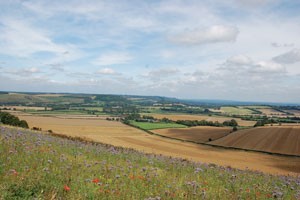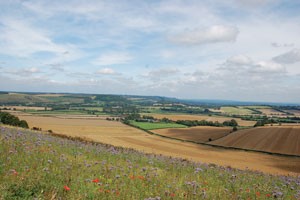 Commenting on Defra’s 2015 UK Biodiversity Indicators Report, BASC, the UK’s largest shooting organisation, has said it is concerned by the continuing downward trend in a number of key indicators but stressed shooting’s contribution to biodiversity and the wider health of the countryside. The report shows continuing declines in farmland birds, pollinating insects and other indicator species. It also shows a decline in the time spent by volunteers on conservation by 23% in the last 5 years. Shooting benefits farmland bird conservation with shooters spending £5.4m on cover crop seeds every year and maintaining over 25,000ha of wild bird cover. These areas are important feeding and holding points for game birds but also have huge value for farmland birds. In addition, figures from the largest survey of shooters carried out in the UK in 2014 showed that those who shoot spend 3.9 million work days annually on conservation, the equivalent of 16,000 full time conservation jobs. To put these figures in context a total of 47,159 work days was spent by volunteers over three years on habitat improvements and species surveys on the government-funded Nature Improvement Area partnerships. Shooting is a major financial contributor to conservation. The Defra report shows that conservation NGOs spend a little more than £200 million on conservation activities. In contrast shoot owners and shooters spent almost £250 million of largely private funds on conservation without the incentives for charitable giving which conservation NGOs benefit from. Tim Russell, Director of Conservation at BASC said: “This report acts as a wake-up call for anyone concerned about British wildlife. This is a responsibility for all of us and we must all do more to ensure a favourable trend in biodiversity indicators. Shooting is showing a sustainable way forward to get biodiversity benefits which are delivered by local people.” Mike Sherman, Vice Chairman of BASC Council said: “We need government led co-operation to turn these continuing declines around. Without that we can only look forward to the bleak prospect of the UK missing its biodiversity targets yet again in 2020. Shooting has a major part to play in turning the situation round and is happy to work with all interests for a healthier, better countryside.”
Commenting on Defra’s 2015 UK Biodiversity Indicators Report, BASC, the UK’s largest shooting organisation, has said it is concerned by the continuing downward trend in a number of key indicators but stressed shooting’s contribution to biodiversity and the wider health of the countryside. The report shows continuing declines in farmland birds, pollinating insects and other indicator species. It also shows a decline in the time spent by volunteers on conservation by 23% in the last 5 years. Shooting benefits farmland bird conservation with shooters spending £5.4m on cover crop seeds every year and maintaining over 25,000ha of wild bird cover. These areas are important feeding and holding points for game birds but also have huge value for farmland birds. In addition, figures from the largest survey of shooters carried out in the UK in 2014 showed that those who shoot spend 3.9 million work days annually on conservation, the equivalent of 16,000 full time conservation jobs. To put these figures in context a total of 47,159 work days was spent by volunteers over three years on habitat improvements and species surveys on the government-funded Nature Improvement Area partnerships. Shooting is a major financial contributor to conservation. The Defra report shows that conservation NGOs spend a little more than £200 million on conservation activities. In contrast shoot owners and shooters spent almost £250 million of largely private funds on conservation without the incentives for charitable giving which conservation NGOs benefit from. Tim Russell, Director of Conservation at BASC said: “This report acts as a wake-up call for anyone concerned about British wildlife. This is a responsibility for all of us and we must all do more to ensure a favourable trend in biodiversity indicators. Shooting is showing a sustainable way forward to get biodiversity benefits which are delivered by local people.” Mike Sherman, Vice Chairman of BASC Council said: “We need government led co-operation to turn these continuing declines around. Without that we can only look forward to the bleak prospect of the UK missing its biodiversity targets yet again in 2020. Shooting has a major part to play in turning the situation round and is happy to work with all interests for a healthier, better countryside.”
Shooting’s contribution to biodiversity keeps growing
